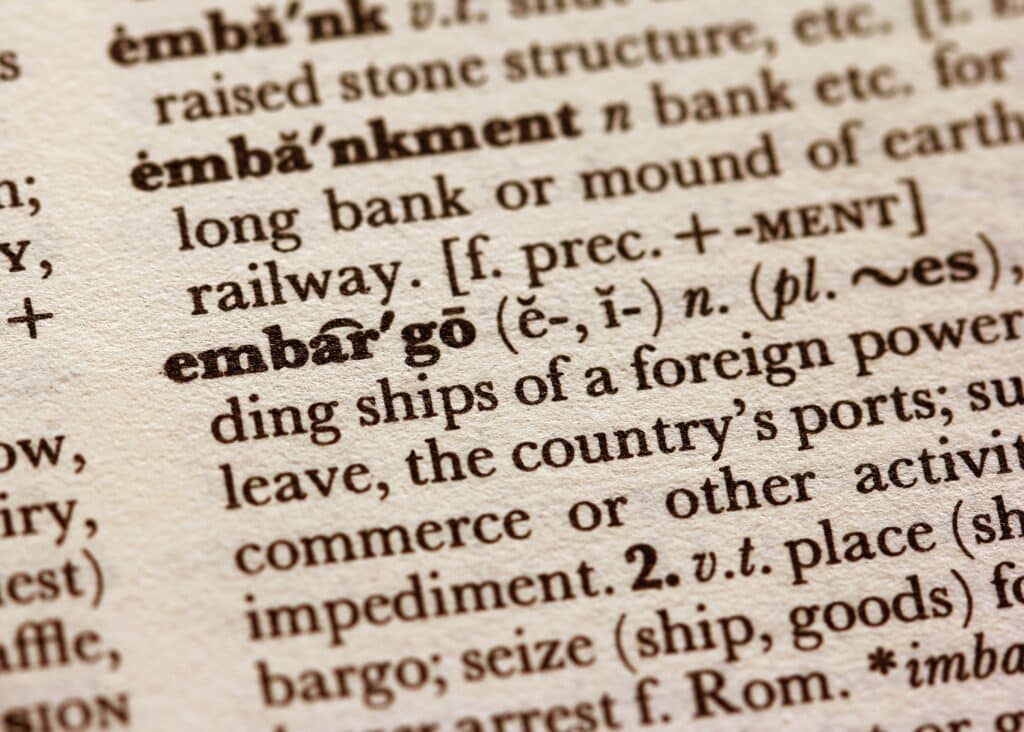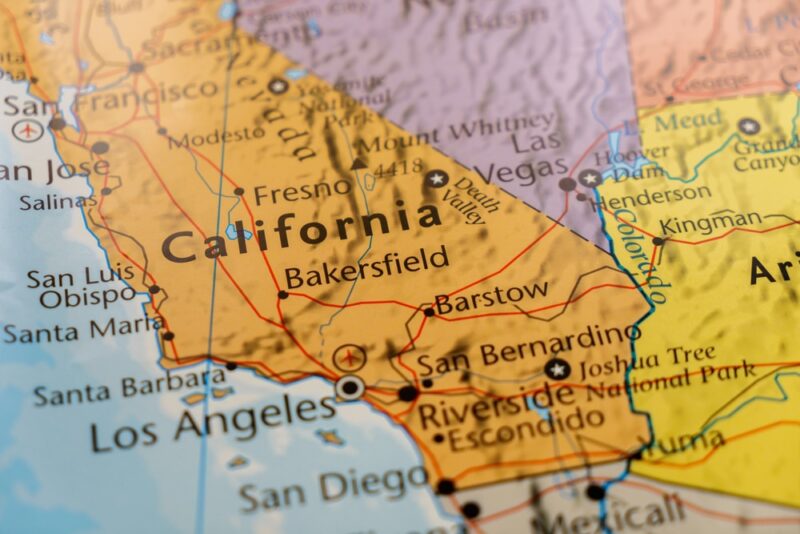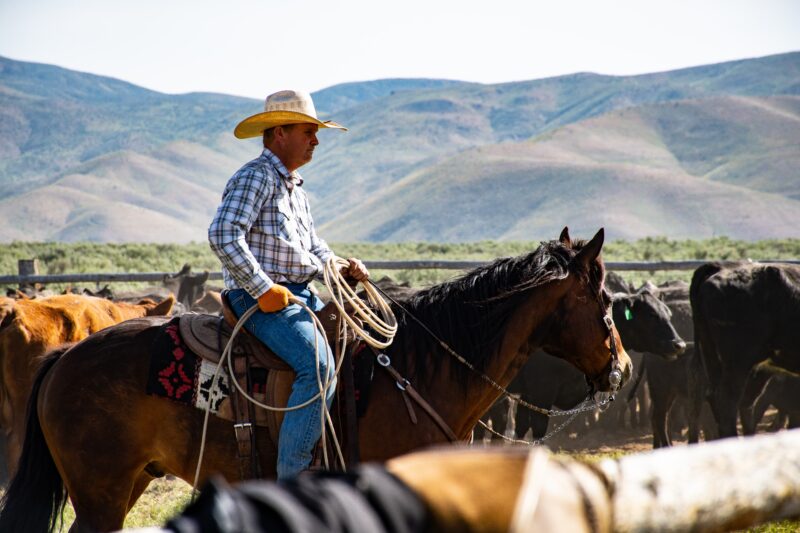When Spanish Words Become Our Own
Adopted and Borrowed Words Enrich English
Una alpaca. (An alpaca.).
Photo by Guido612; licensed via Creative Commons.
Rodeo, pronto, taco, enchilada — English or Spanish?
The answer, of course, is both. For English, like most languages, has expanded over the years through assimilation of words from other tongues. As people of different languages intermingle, inevitably some of the words of one language become words of the other.
It doesn’t take someone who studies etymology to look at a Spanish-language website (or the websites in nearly any other language) to see how English vocabulary, particularly as it relates to technical subjects, is spreading. And while English now may be giving more words to other languages than it is absorbing, that wasn’t always true. For the English vocabulary today is as rich as it is largely because it accepted words from Latin (mostly by way of French). But there’s also a small share of the English language that is derived from Spanish.
Words From Various Origins
Many Spanish words have come to us from three primary sources. As you can hypothesize from the list below, many of them entered American English in the days of Mexican and Spanish cowboys working in what is now the U.S. Southwest. Words of Caribbean origin entered English by way of trade. The third major source is food vocabulary, especially for foods whose names have no English equivalent, as the intermingling of cultures has expanded our diets as well as our vocabulary. As you can see, many of the words changed meaning upon entering English, often by adopting a narrower meaning than in the original language.
Spanish Words Assimilated Into English
Following is a list, by no means complete, of Spanish loanwords that have become assimilated into the English vocabulary. As noted, some of them were adopted into the Spanish language from elsewhere before they were passed on to English. Although most of them retain the spelling and even (more or less) the pronunciation of Spanish, they are all recognized as English words by at least one reference source.
A–B: Adios to Burro
- adios (from adiós)
- adobe (originally Coptic tobe, «brick»)
- aficionado
- albino
- alcove (from Spanish alcoba, originally Arabic al-qubba)
- alfalfa (originally Arabic al-fasfasah. Many other English words beginning with «al» were originally Arabic, and many may have had a Spanish-language connection in becoming English.)
- alligator (from el lagarto, «the lizard»)
- alpaca (animal similar to a llama, from Aymara allpaca)
- armada
- armadillo (literally, «the little armed one»)
- arroyo (English regionalism for «stream»)
- avocado (originally a Nahuatl word, ahuacatl)
- bajada (a geological term referring to a type of alluvial slope at the base of a mountain, from bajada, meaning «slope»)
- banana (word, originally of African origin, entered English via either Spanish or Portuguese)
- bandoleer (type of belt, from bandolera)
- barbecue (from barbacoa, a word of Caribbean origin)
- barracuda
- bizarre (some sources, not all, say this word came from the Spanish bizarro)
- bonanza (although the Spanish bonanza can be used synonymously with the English cognate, it more often means «calm seas» or «fair weather»)
- booby (from bobo, meaning «silly» or «selfish»)
- bravo (from either Italian or Old Spanish)
- bronco (means «wild» or «rough» in Spanish)
- buckaroo (possibly from vaquero, «cowboy»)
- bunco (probably from banco, «bank»)
- burrito (literally «little donkey»)
- burro
C: Cafeteria to Criollo
- cafeteria (from cafetería)
- caldera (geological term)
- canary (Old Spanish canario entered English by way of French canarie)
- canasta (the Spanish word means «basket»)
- cannibal (originally of Caribbean origin)
- canoe (the word was originally Caribbean)
- canyon (from cañón)
- cargo (from cargar, «to load»)
- castanet (from castañeta)
- chaparral (from chaparro, an evergreen oak)
- chaps (from Mexican Spanish chaparreras)
- chihuahua (dog breed named after Mexican city and state)
- chile relleno (Mexican food)
- chili (from chile, derived from Nahuatl chilli)
- chili con carne (con carne means «with meat»)
- chocolate (originally xocolatl, from Nahuatl, an indigenous Mexican language)
- churro (Mexican food)
- cigar, cigarette (from cigarro)
- cilantro
- cinch (from cincho, «belt»)
- cocaine (from coca, from Quechua kúka)
- cockroach (Two English words, «cock» and «roach,» were combined to form «cockroach.» It is believed, but isn’t certain, that the words were chosen because of their similarity to the Spanish cucaracha.)
- coco (type of tree, from icaco, originally Arawak ikaku from the Caribbean)
- comrade (from camarada, «roommate»)
- condor (originally from Quechua, an indigenous South American language)
- conquistador
- corral
- coyote (from the Nahuatl coyotl)
- creole (from criollo)
- criollo (English term refers to someone indigenous to South America; Spanish term originally referred to anyone from a particular locality)
D–G: Dago to Guerrilla
- dago (offensive ethnic term comes from Diego)
- dengue (Spanish imported the word from Swahili)
- desperado
- dorado (type of fish)
- El Niño (weather pattern, means «The Child» due to its appearance around Christmas)
- embargo (from embargar, to bar)
- enchilada (participle of enchilar, «to season with chili»)
- fajita (diminutive of faja, a belt or sash, probably so named due to strips of meat)
- fiesta (in Spanish, it can mean a party, a celebration, a feast — or a fiesta)
- filibuster (from filibustero, derived from Dutch vrijbuiter, «pirate»)
- flan (a type of custard)
- flauta (a fried, rolled tortilla)
- flotilla
- frijol (English regionalism for a bean)
- galleon (from Spanish galeón)
- garbanzo (type of bean)
- guacamole (originally from Nahuatl ahuacam, «avocado,» and molli, «sauce»)
- guerrilla (In Spanish, the word refers to a small fighting force. A guerrilla fighter is a guerrillero.)
H–L: Habanero to Llama
- habanero (a type of pepper; in Spanish, the word refers to something from Havana)
- hacienda (in Spanish, the initial h is silent)
- hammock (from jamaca, a Caribbean Spanish word)
- hoosegow (slang term for a jail comes from Spanish juzgado, participle of juzgar, «to judge»)
- huarache (type of sandal)
- hurricane (from huracán, originally an indigenous Caribbean word)
- iguana (originally from Arawak and Carib iwana)
- incomunicado
- jaguar (from Spanish and Portuguese, originally from Guarani yaguar)
- jalapeño
- jerky (the word for dried meat comes from charqui, which in turn came from the Quechua ch’arki)
- jicama (originally from Nahuatl)
- key (the word for a small island comes from the Spanish cayo, possibly of Caribbean origin)
- lariat (from la reata, «the lasso»)
- lasso (from lazo)
- llama (originally from Quechua)
M–N: Machete to Nopal
- machete
- machismo
- macho (macho usually means simply «male» in Spanish)
- maize (from maíz, originally from Arawak mahíz)
- manatee (from manatí, originally from Carib)
- mano a mano (literally, «hand to hand»)
- margarita (a woman’s name meaning «daisy»)
- mariachi (a type of traditional Mexican music, or a musician)
- marijuana (usually mariguana or marihuana in Spanish)
- matador (literally, «killer»)
- menudo (Mexican food)
- mesa (In Spanish it means «table,» but it also can mean «tableland,» the English meaning.)
- mesquite (tree name originally from Nahuatl mizquitl)
- mestizo (a type of mixed ancestry)
- mole (The name for this delightful chocolate-chili dish is sometimes misspelled as «molé» in English in an attempt to prevent mispronunciation.)
- mosquito
- mulatto (from mulato)
- mustang (from mestengo, «stray»)
- nacho
- nada (nothing)
- negro (comes from either the Spanish or Portuguese word for the color black)
- nopal (type of cactus, from Nahuatl nohpalli)
O–P: Ocelot to Punctilio
- ocelot (originally Nahuatl oceletl; the word was adopted into Spanish and then French before becoming an English word)
- olé (in Spanish, the exclamation can be used in places other than bullfights)
- oregano (from orégano)
- paella (a savory Spanish rice dish)
- palomino (originally meant a white dove in Spanish)
- papaya (originally Arawak)
- patio (In Spanish, the word most often refers to a courtyard.)
- peccadillo (from pecadillo, diminutive of pecado, «sin»)
- peso (Although in Spanish a peso is also a monetary unit, it more generally means a weight.)
- peyote (originally Nahuatl peyotl)
- picaresque (from picaresco)
- pickaninny (offensive term, from pequeño, «small»)
- pimento (Spanish pimiento)
- pinole (a meal made of grain and beans; originally Nahuatl pinolli)
- pinta (tropical skin disease)
- pinto (Spanish for «spotted» or «painted»)
- piñata
- piña colada (literally meaning «strained pineapple»)
- piñon (type of pine tree, sometimes spelled «pinyon»)
- plantain (from plátano or plántano)
- plaza
- poncho (Spanish adopted the word from Araucanian, an indigenous South American language)
- potato (from batata, a word of Caribbean origin)
- pronto (from an adjective or adverb meaning «quick» or «quickly»)
- pueblo (in Spanish, the word can mean simply «people»)
- puma (originally from Quechua)
- punctilio (from puntillo, «little point,» or possibly from Italian puntiglio)
Q–S: Quadroon to Stockade
- quadroon (from cuaterón)
- quesadilla
- quirt (type of riding whip, comes from Spanish cuarta)
- ranch (Rancho often means «ranch» in Mexican Spanish, but it can also mean a settlement, camp or meal rations.)
- reefer (drug slang, possibly from Mexican Spanish grifa, «marijuana»)
- remuda (regionalism for a relay of horses)
- renegade (from renegado)
- rodeo
- rumba (from rumbo, originally referring to the course of a ship and, by extension, the revelry aboard)
- salsa (In Spanish, almost any kind of a sauce or gravy can be referred to as salsa.)
- sarsaparilla (from zarza, «bramble,» and parrilla, «small vine»)
- sassafras (from sasafrás)
- savanna (from obsolete Spanish çavana, originally Taino zabana, «grassland»)
- savvy (from sabe, a form of the verb saber, «to know»)
- serape (Mexican blanket)
- serrano (type of pepper)
- shack (possibly from Mexican Spanish jacal, from the Nahuatl xcalli, «adobe hut»)
- siesta
- silo
- sombrero (In Spanish, the word, which is derived from sombra, «shade,» can mean almost any kind of hat, not just the traditional broad-rimmed Mexican hat.)
- spaniel (ultimately from hispania, the same root that gave us the words «Spain» and español)
- stampede (from estampida)
- stevedore (from estibador, one who stows or packs things)
- stockade (from a French derivation of the Spanish estacada, «fence» or «stockade»)
T–Z: Taco to Zapateado
- taco (In Spanish, a taco can refer to a stopper, plug or wad. In other words, a taco originally meant a wad of food. Indeed, in Mexico, the variety of tacos is almost endless, far more varied than the beef, lettuce and cheese combination of U.S.-style fast food.)
- tamale (The Spanish singular for this Mexican dish is tamal. The English comes from an erroneous backformation of the Spanish plural, tamales.)
- tamarillo (type of tree, derived from tomatillo, a small tomato)
- tango
- tejano (type of music)
- tequila (named after a Mexican town of the same name)
- tobacco (from tabaco, a word possibly of Caribbean origin)
- tomatillo
- tomato (from tomate, derived from Nahuatl tomatl)
- toreador
- tornado (from tronada, thunderstorm)
- tortilla (in Spanish, an omelet often is a tortilla)
- tuna (from atún)
- vamoose (from vamos, a form of «to go»)
- vanilla (from vainilla)
- vaquero (English regionalism for a cowboy)
- vicuña (animal similar to a llama, from Quechua wikuña)
- vigilante (from adjective for «vigilant»)
- vinegarroon (from vinagrón)
- wrangler (some sources say word is derived from Mexican Spanish caballerango, one who grooms horses, while other sources say the word comes from German)
- yucca (from yuca, originally a Caribbean word)
- zapateado (a type of dance emphasizing movement of the heels)
Can you believe that loanwords make up more than three-quarters of the English language? Studies of the etymology of English words have made it clear that the vast majority of English vocabulary has been taken from, or highly influenced by, other languages. It is clear that English has been borrowing words from other languages for centuries, many of which come from Spanish!
What Loanwords from Spanish Tell Us
Loanwords from Spanish offer us a glimpse into the history of colonialism, westward expansion, immigration, and trade. For centuries, there has been significant interaction between native English and Spanish speakers. As a result, thousands of Spanish words have become part of the English language.
Many of the earliest loanwords on record were a result of secondary borrowing. The Spanish colonization of the Americas brought about frequent interactions between the first Spanish explorers and the indigenous people of the region. Native terms for plants, animals, and other indigenous concepts were absorbed into the Spanish language, then later passed on to English.
Other loanwords from Spanish can be attributed to westward expansion in the 19th century. As English-speaking settlers moved from the East Coast to the North American Southwest, contact increased between Spanish-speaking and English-speaking communities. Many of the loanwords that were adopted at this time were related to mining, cattle farming, cooking, and cowboy culture. The California Gold Rush led to a rapid increase in the number of immigrants, many from Latin America. This resulted in more loanwords, many of which were slang.
Other factors that have contributed to the increase in Spanish loanwords in English include Puerto Rico becoming a part of the United States, trade with Caribbean countries, and the proximity of Mexico to the United States.
Indigenous Words
Below are some common words that have made their way into English from various indigenous languages of the Americas. Spanish adopted them first, and English adopted them from Spanish!
| Indigenous Language | Spanish | English |
|---|---|---|
| āhuacatl |
|
avocado |
| ahuacamull |
|
guacamole |
| cacáhua |
|
cocoa |
| ch’arki |
|
jerky |
| chilli |
|
chili pepper |
| chilpoctli |
|
chipotle pepper |
| coyotl |
|
coyote |
| hunraken |
|
hurricane |
| iwana |
|
iguana |
| pontho |
|
poncho |
| tamalli |
|
tamale |
| tomatl |
|
tomato |
| xicamatl |
|
jicama |
| xocolatl |
|
chocolate |
| yaguar |
|
jaguar |
Cowboy Words
Here are some of the words that were adopted into English by Anglo-American cowboys working in the southwestern United States.
| Spanish | English |
|---|---|
|
|
stampede |
|
|
canyon |
|
|
chaps |
|
|
corral |
|
|
hacienda |
|
|
lasso |
|
|
ranch |
| rodear(to round up) | rodeo |
|
|
sombrero |
|
|
buckaroo/cowboy |
Contrary to popular belief, the term ten-gallon hat does not refer to its capacity. Legend has it that this term derives from the Spanish word galón meaning braid. In the past, Mexican cowboys wore galones on their cowboy hats, and a ten-gallon hat could fit—you guessed it!—ten galones.
Foods
Thanks to the popularity of Mexican cuisine in the United States, many adopted Spanish words are food terms, such as taco, burrito, tortilla, and jalapeño. Many borrowed food terms have no English equivalent, and we sometimes forget that we are using Spanish words because they are so deeply embedded in the English language!
Other borrowed food words have been changed slightly, such as maize from the Spanish word maízand vanilla from the Spanish word vainilla.
Animals
A number of animal words are borrowed words. Alligator comes from lagarto, the Spanish term for lizard. Armadillo is a Spanish word meaning little armored one and mosquito means little fly. Cockroach comes from the Spanish cucaracha.
Cities and States
In the United States hundreds of city names derive from Spanish. Buena Vista means good view, El Paso means the pass, Fresno means ash tree, and Las Vegas translates as the meadows.
There are also many state names of Spanish origin. New Mexico is an anglicization of Nuevo México, Florida means flowery, Nevada means snowy, and Montana comes from the Spanish word montaña(mountain).
Additional Loanwords
There are many other words in English that derive from Spanish. The word cargo comes from the Spanish verb cargar, meaning to load. Tornado comes from tronada, which means thunderstorm. And vamoose comes from vamos, which means let’s go.
Here’s a list of more loanwords from Spanish that are common in the English language!
| Spanish | English |
|---|---|
|
|
breeze |
|
|
booby (stupid person) |
|
|
cabana |
|
|
cafeteria |
|
|
cauldron |
|
|
comrade |
|
|
machete |
|
|
patio |
|
|
plaza |
|
|
renegade |
|
|
siesta |
Continue Learning about Other Arts
What is the English word for the Spanish word stretching?
Stretching is not a Spanish word. It is an English word.
What does the Spanish word cognates translate to in English?
Cognates is an ENGLISH word, not a Spanish word.
What does the Spanish word modelo in English?
Spanish word modelo mean in English.
What does the Spanish word a mean in English?
«A» is the Spanish word for «to».
What does Spanish to English mean?
a translation of a spanish word to English
As you study a foreign language, it is quite likely you will encounter words that have been borrowed from English. However, this process works both ways and English has also adopted a number of ‘loan’ words from foreign languages too. In fact, you probably use several of these words on a regular basis, without giving it much thought.
While these loan words come from various different languages, Spanish words feature prominently. Indeed, over the centuries, Spanish words have travelled all over the world, thanks to factors like Spanish colonialism, migration, the Hispanic influence on art and culture, and inventions and innovations with a Spanish origin.
For example, if something is invented in the English-speaking world, the inventor will typically name it and that chosen name will often be adopted by other languages too. The exact same thing happens if a piece of technology, or even an idea, originates in a Spanish-speaking region.
Spanish Words That Are Used in English
Below, we take a closer look at some of the most common examples of Spanish loan words used by English speakers, along with an explanation of the origin of the word. In each case, the word has retained its original spelling and has essentially become a recognised part of the English language, despite having its roots in Spanish.
1. Siesta
Although the concept of an afternoon nap is observed in a huge number of other countries, it is most closely associated with Spain and other cultures with a clear Hispanic link, such as the Philippines. The word itself means ‘nap’ and is used in various languages, including English, to describe the practice.
2. Plaza
The word ‘plaza’ roughly translates to ‘public square’ and has a prominent role in Hispanic culture. Most of the colonial cities in Spanish America and the Philippines were built around a square section, which would typically contain some of the most important buildings, such as law courts and administrative centres.
3. California
The largest state in the United States of America in terms of population, California shares a border with Mexico and has a fascinating history. It was previously part of the Spanish Empire’s ‘New Spain’ colony and briefly became part of Mexico during the 1800s. It is said to be named after a mythical island from a 16th century Spanish novel.
4. Guerrilla
Translating to ‘little war’, the word guerrilla is typically used to describe small groups of combatants using unconventional tactics to fight a larger, more conventional army. The phrase is believed to originate from the Peninsular War, where Spanish fighters fought against Napoleon’s forces.
5. Mosquito
It is believed that the word ‘mosquito’ actually has North American origin, with the first recorded usage occurring in the 16th century. However, the word itself is Spanish, translating to ‘little fly’. Its adoption is likely the result of European colonisation of the continent, which began in 1492 with a Spanish expedition led by Christopher Columbus.
6. Fiesta
The Spanish word for ‘festival’, it was originally used predominantly to describe religious celebrations in Spanish cultures, but is now often used by English speakers when referring to any festivities. The car manufacturer Ford also has a vehicle called the Ford Fiesta, which is one of its best-selling models.
7. Tequila
A popular drink all over the world, ‘Tequila’ is a drink of Mexican origin and its name has a very simple explanation. It was first created near the Mexican city of Tequila, Jalisco. During the 19th century, it began to be exported to the United States and its name was shortened from ‘Tequila Extract’ to ‘Tequila’.
8. Armada
The Spanish word for a naval fleet, the word ‘armada’ entered the English language during the 16th century, when a naval invasion was sent to England by Philip II of Spain. This is commonly referred to as the Spanish Armada and the word ‘armada’ is now used within the English language in a more general sense to refer to warships.
9. Macho / Machismo
Historically, the Spanish word ‘macho’ referred to the masculine role men were expected to play in Iberian cultures. The concept of ‘machismo’ made its way into other cultures through things like literature and the arts and is now used to describe a particular version of manliness, built on self-reliance and strength. In more recent times, the word has also developed negative connotations, being linked with ideas like male aggression and oppression of women.
10. Armadillo
Originating in South America, armadillos are mammals and are perhaps most notable for their leathery armoured shell, which offers them protection from predators. Given their geographical origin, it is perhaps little surprise that their name is derived from Spanish. In actual fact, it literally translates to ‘little armoured one’.
Spanish Words That SHOULD Be Used in English
In addition to the hundreds of Spanish words that have been adopted for usage within the English language, we have compiled a list of Spanish words that we believe should be adopted. All of these words currently have no direct English language equivalent and so are considered to be ‘untranslatable’.
| Anteayer | A singular word meaning ‘the day before yesterday’. |
| Sobremesa | The point at the end of a meal, after everyone has finished, but the conversation continues. |
| Enchilar | To become red in the face after eating food containing chilli |
| Vergüenza ajena | Shame or embarrassment felt on behalf of others, even if they do not feel it themselves. |
| Quincena | A period of 15 days; or the 15th day of the month, marking the halfway point. |
| Entrecejo | The hairless space in between the eyebrows. |
| Lampiño – imberbe | A man who either cannot grow facial hair, or has very sparse facial hair, which looks terrible. |
| Estrenar | To wear a new item of clothing or use a new purchase for the first time. |
| Te quiero | Used when you like someone as more than a friend, but do not quite ‘love’ them yet. |
By
Last updated:
March 8, 2023
The English language is drawn to the Spanish language.
Many English-language words come directly from the Spanish language—and I’m not just talking about the ones you find on the menu at your local Mexican or quasi-Mexican restaurant.
From “canyon” to “alligator,” you’ll be surprised by just how much the Spanish language has influenced English!
Here, we’ll teach you 70 English words of Spanish Origin.
Contents
- US Location Names
-
- 1. Arizona
- 2. California
- 3. Colorado
- 4. Florida
- 5. Montana
- 6. Nevada
- 7. Texas
- 8. Puerto Rico
- 9. Los Angeles
- 10. Las Vegas
- 11. “San” anything
- Places
-
- 12. Cafeteria
- 13. Canyon
- 14. Corral
- 15. Mesa
- 16. Patio
- 17. Plaza
- 18. Ranch
- 19. Savanna
- Food
-
- 20. Anchovy
- 21. Banana
- 22. Barbecue
- 23. Burrito
- 24. Chocolate
- 25. Churro
- 26. Cilantro
- 27. Gordita
- 28. Jerky
- 29. Mojito
- 30. Pimento
- 31. Piña Colada
- 32. Potato
- 33. Tomato
- 34. Tuna
- Animals35. Alligator
-
- 36. Alpaca
- 37. Armadillo
- 38. Barracuda
- 39. Cockroach
- 40. Condor
- 41. Coyote
- 42. Iguana
- 43. Llama
- 44. Mosquito
- 45. Mustang
- People
-
- 46. Buckaroo
- 47. Comrade
- 48. Renegade
- 49. Vigilante
- Things
-
- 50. Armada
- 51. Bonanza
- 52. Bronco
- 53. Breeze
- 54. Canoe
- 55. Cargo
- 56. Cigar
- 57. Cojones
- 58. Embargo
- 59. Flotilla
- 60. Guerrilla
- 61. Hurricane
- 62. Jade
- 63. Junta
- 64. Lasso
- 65. Macho
- 66. Platinum
- 67. Rodeo
- 68. Stampede
- 69. Suave
- 70. Tornado
Download:
This blog post is available as a convenient and portable PDF that you
can take anywhere.
Click here to get a copy. (Download)
US Location Names
1. Arizona
Despite rumors to the contrary, this isn’t Spanish for “arid zone.” Instead, the name Arizona was derived from the Spanish name Arizonac, which was in turn derived from an O’odham phrase meaning “small stream.”
2. California
The name California originated in the 1510 book “Las sergas de Esplandián” (“The Adventures of Esplandián”). In the story, California was a remote kingdom inhabited only by women. The name came from the name of their queen, Calafia. Her name may have come from the Spanish word califa, which came from the Arabic word khalifa, referring to a religious state leader.
3. Colorado
While the state itself derived its name from the Colorado River, the river got its name from the Spanish word colorado , meaning “red.”
4. Florida
Florida in Spanish is an adjective meaning “flowered” or “flowery.”
5. Montana
The name Montana comes from the Spanish word montaña , which means “mountain.”
6. Nevada
Though you’d never guess it from the bright lights and vast deserts in this state, the Spanish adjective nevada means “snowy” or “snow-covered,” and as a noun it means “snowfall.” It was named for the snow that blankets the mountains in winter.
7. Texas
The name Texas originated from the Spanish word tejas , derived from a Caddo word for “friends.”
8. Puerto Rico
In Spanish, puerto means “port” while rico means “rich,” so this name literally means “rich port.”
9. Los Angeles
Ever wonder why Los Angeles is called “The City of Angels”? There’s an easy answer: The Spanish phrase los ángeles means “the angels.”
10. Las Vegas
Las Vegas means “the meadows”—and you’ll be skipping through them if you hit the jackpot!
11. “San” anything
The Spanish word san means “saint,” so any city that begins with San is just “Saint” something. For instance, San Diego is the Spanish name for Saint Didacus of Alcalá, and San Antonio is the Spanish name for Saint Anthony of Padua.
Places
12. Cafeteria
The word “cafeteria” originated from the Latin American Spanish word cafetería , which meant “coffee shop.” Nowadays, though, the Spanish café is a more commonly used term for “coffee shop,” and cafetería has come to mean… you guessed it, “cafeteria.”
13. Canyon
“Canyon” came from the Spanish word cañón , meaning “tube,” “pipe” or “gorge.”
14. Corral
This word comes from the Spanish word corral . In both Spanish and English, it refers to a pen or farmyard enclosure.
15. Mesa
In English, a “mesa” is a large plateau, but it originated from the Spanish word mesa , which means “table.”
16. Patio
In both English and the original Spanish, patio is a type of courtyard.
17. Plaza
In English, this is a public square. The Spanish term plaza originally meant “place,” but it now can also be used to refer to a public square.
18. Ranch
“Ranch” originated from the Spanish word rancho which can refer to either a ranch or a communal meal.
19. Savanna
“Savanna” comes from the Spanish word sabana . They share the same meaning.
Food
20. Anchovy
From the Spanish word anchoa . You can blame the Spanish for the name when someone tries to sneak some of these onto your pizza.
21. Banana
Though it’s debated, some believe this word originated from the Spanish word banana , which originated from the Mande word banana. They all refer to the same fruit.
22. Barbecue
“Barbecue” is derived from the Spanish word barbacoa which may have come from the Arawak language. In Spanish, barbacoa is, in fact, meat that’s slow cooked on an open fire—anybody else craving Chipotle now?
23. Burrito
Now known as a delicious rolled dish in both Spanish and English, the word burrito originally meant (and can still mean) “little donkey.”
24. Chocolate
The English word “chocolate” originates from chocolate in Spanish, which is derived from the Nahuatl word chocolatl.
25. Churro
Of course, in both Spanish and English it can be used to refer to the delicious fried dough. But in Spanish, it originally meant “fritter.” Now it’s popular as slang with many different meanings ranging from “a mess” to “disaster” to more vulgar things.
26. Cilantro
You might know that the English word “cilantro” came from the Spanish word cilantro . What you might not have known is that, outside of the US, the same herb is often referred to as “coriander” or “coriander leaves.” Looks like the Spanish name really stuck in the US!
27. Gordita
While it’s sometimes used to refer to a particular type of dish in the US, in Spanish gordita literally means “little fatty” and is used as a term of endearment.
28. Jerky
This is derived from the Spanish word charqui which was derived from a Quechua word. In Spanish, it can refer to dried meat or fruit.
29. Mojito
In both Spanish and English, mojito refers to the classic drink. However, the word was originally derived from the Spanish word mojado , meaning “wet.”
30. Pimento
“Pimento” comes from the Spanish word pimiento , meaning “pepper.”
31. Piña Colada
Though you may be more familiar with the drink in English-speaking countries, both words in its name are Spanish. Piña is “pineapple,” while colada means “strained.”
32. Potato
“Potato” comes from the Spanish word patata , which comes from the Taíno word batata.
33. Tomato
“Tomato” comes from the Spanish word tomate which comes from the Nahuatl word xitomatl.
34. Tuna
While it has older roots in several languages, the English word “tuna” is derived from the Spanish word atún . The exact origins seem fishy.
Animals 35. Alligator
35. Alligator
“Alligator” comes from the Spanish phrase el lagarto , which means “the lizard.”
36. Alpaca
This word comes from the Spanish word alpaca, which is derived from the Aymara word allpaca.
37. Armadillo
Though it now refers to the animal in both Spanish and English, the original meaning of armadillo was “little armed one.”
38. Barracuda
In both English and Spanish, barracuda refers to the same fish. It is thought to have been derived from a Cariban language.
39. Cockroach
The word “cockroach” comes from cucaracha , the Spanish word for the same pest.
40. Condor
“Condor” came from the Spanish word, cóndor, which came from Quechua.
41. Coyote
The name of this animal came from the Spanish name for the animal, coyote, which itself came from a Nahuatl word.
42. Iguana
Derived from Spanish, which derived it from Arawak, iguana has the same spelling and meaning in both Spanish and English.
43. Llama
This word passed from Quechua to Spanish to English. It has the same spelling and meaning in all three languages.
44. Mosquito
Though it now has the same meaning in both Spanish and English, the literal translation was originally “little fly.”
45. Mustang
“Mustang” is thought to have originated from the words mostrenco and mestengo, which both referred to free-roaming cattle but now simply means “unclaimed” or “without owner.”
People
46. Buckaroo
This old-timey term was derived from the word vaquero which means “cowboy.”
47. Comrade
“Comrade” is thought to come from the Spanish word camarada, which means “companion.”
48. Renegade
The original Spanish word renegado was used to refer to a rebel or turncoat.
49. Vigilante
“Vigilante” comes from the Spanish term with the same spelling. In Spanish, it means “watchman” or “guard.”
Things
50. Armada
The word for this grouping of ships comes from the Spanish term of the same spelling and meaning.
51. Bonanza
You’ll probably shout this out when you strike gold, but in the original Spanish, it simply meant (and still means) “prosperity.”
52. Bronco
In English, we use the term to refer to a bucking horse. But the original Spanish word actually means “rough” or “coarse.”
53. Breeze
“Breeze” likely comes from the Spanish word brisa, which shares the same meaning.
54. Canoe
“Canoe” likely comes from the Spanish word canoa, which shares the same meaning. The Spanish word is believed to have come from another language, though theories tend to vary.
55. Cargo
The English word “cargo” is derived from the Spanish word cargo. They share the same meaning.
56. Cigar
“Cigar” likely comes from the Spanish word cigarro which comes from the adopted Mayan word sikar meaning “to smoke.”
57. Cojones
While used in English to denote courage, the original Spanish word of the same spelling means “testicles.”
58. Embargo
The original Spanish word shares the same spelling and meaning as the English word. Both are used to describe official bans on trade.
59. Flotilla
In both English and Spanish, a “flotilla” is a fleet of ships, though the literal meaning in Spanish is “little fleet.”
60. Guerrilla
In both English and Spanish, “guerrilla” has come to refer to an armed person or group. However, the original Spanish meaning is “little war.”
61. Hurricane
The English word came from the Spanish word huracán (same meaning), which likely came from an indigenous American language.
62. Jade
The word “jade” is derived from the Spanish term for the same stone, piedra de ijada, which literally means “stone of the flank.”
63. Junta
The English word “junta,” which often refers to a coup d’état, is derived from the Spanish word junta, which can mean “joint” or “committee.”
64. Lasso
“Lasso” comes from the Spanish word lazo meaning “bow,” “knot” or “tie.”
65. Macho
This word shares the same spelling and meaning in both Spanish and English.
66. Platinum
This English word is derived from the Spanish word for the same metal, platino, which literally means “little silver.” The Spanish word platino was originally known as platina from the word plata (silver).
67. Rodeo
Though in both Spanish and English this word can refer to a cowboy show, the original Spanish word comes from the verb rodear meaning “to go around.”
68. Stampede
“Stampede” comes from the Spanish word estampida. They share the same meaning.
69. Suave
The English word “suave” comes from the Spanish word suave, which means “smooth” or “charming.”
70. Tornado
“Tornado” is derived from two Spanish words: tronada (thunderstorm) and tornar (to turn).
As you can see, there are so many English words of Spanish origin. English and Spanish have both had an influence on each other, with each language adopting words from the other over the course of history.
A great way to become familiar with these words is to consume native media and see how the languages are spoken by native speakers. There are many different ways to immerse yourself in native media, such as watching videos on YouTube, or you could even try a language learning program like FluentU.
FluentU uses authentic videos such as movie clips, music videos and interesting talks to immerse you in the language. Each video comes with interactive subtitles which you can hover over for definitions and more information about the words used.
By seeing how words are used by native speakers, you’ll find it easier to make the connection between the languages!
FluentU is available to access on your browser or by downloading the iOS or Android app.
Now that you know the hidden Spanish origins of these English words, your vocabulary (and your spelling) will thank you!
Download:
This blog post is available as a convenient and portable PDF that you
can take anywhere.
Click here to get a copy. (Download)
By: Juilet England — Updated: 14 Jul 2017
| 

Spanish is one of the main Latin or Romance languages, and as such, its influence and inflections can be heard throughout the world. But its influence on English is marked.
Words you Already Know
You almost certainly know far more Spanish than you think. Just think of how often words and phrases like siesta, adios, ‘mañana attitude’, hasta la vista, baby’, amigo, and even ‘no way, José’, are bandied about, often in a jokey, slangy way.
Even our word ‘orange’ ultimately comes from the Spanish word naranja – via Old French and Sanskrit!
Influence on American English
American English, in particular, has borrowed much from Spanish. So many place names in the States are words with Spanish origins – Los Angeles, San Diego, Colorado and San Francisco.
History
The Spanish influence on the English language was especially important in the sixteenth century, when Spain was a global military and political power, and in conflict with Britain at the same time. This gathered in momentum after the Spanish first arrived in the Americas.
During the westward migration and growth of the cattle trade in the US in the 1870s in the states and territories which had been part of Mexico, namely Texas, New Mexico, Arizona, California, Nevada, Utah, Colorado, the settlers borrowed much from Mexican Spanish.
More Spanish words entered English following the American acquisition of Puerto Rico after the 1898 Spanish-American War. But by then many Spanish words were already a feature of everyday American English idiom, and most contributions had come from the Mexicans, since they lived in large numbers in those territories which the United States took over.
Today this influence can be most obviously seen in the number of words of Spanish origin which English, particularly American English, has adopted. This is especially true of terms from ‘Wild West’ films – such as buckaroo, corral, gringo and so on.
Making Spanish-sounding Words
But, more than just words, Spanish has also made its mark on English derivational morphology – or the way the meaning of words is changed by applying derivations. (This is not something which can be said of most other living languages.) For example, the addition of ‘-tería’ to make words like cafeteria betrays the Spanish origins of those words.
Even the addition of ‘-aroo’, which appeared in 1930s American English to make new, jokey words like ‘stinkaroo’ came from the word ‘buckaroo’ which originally came from the Spanish word for cowboy, ‘vaquero’.
This slangy character can also be seen in the other ways in which American English uses bits of Spanish to make new words. An example is the use of ‘esta’ to denote extra fanfare in words such as ‘Hallowesta’ (instead of Halloween.)
Then there is the use of ‘el’ and ‘o’ (a common form of Spanish singular masculine noun) to make amusing versions of whatever word is being changed – such as ‘el cheapo’ to mean a cheap product of some kind.
Still more recent is the use of ‘ista’, a Spanish suffix, in the English language. For example ‘fashionista’, or ‘Guardianista’ to describe a certain type of Guardian-reading, politically correct left-wing liberal.
Which all goes to show, love it or loathe it, the influence of Spanish on the English language is pronounced, and not to be underestimated.
You might also like…
Share Your Story, Join the Discussion or Seek Advice..
I have found this website very useful and the present article has helped me a lot in understanding the influence of Spanish on English. I just have one question: What does a Spanish speaking person mean when he/she says «wors» and «feelers» in trying to converse in English. Thank you in anticipation of the answer.
Rhodes — 14-Jul-17 @ 9:59 PM
Validate:









 35. Alligator
35. Alligator

